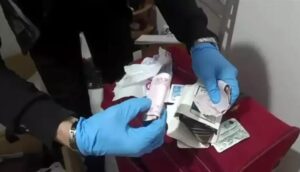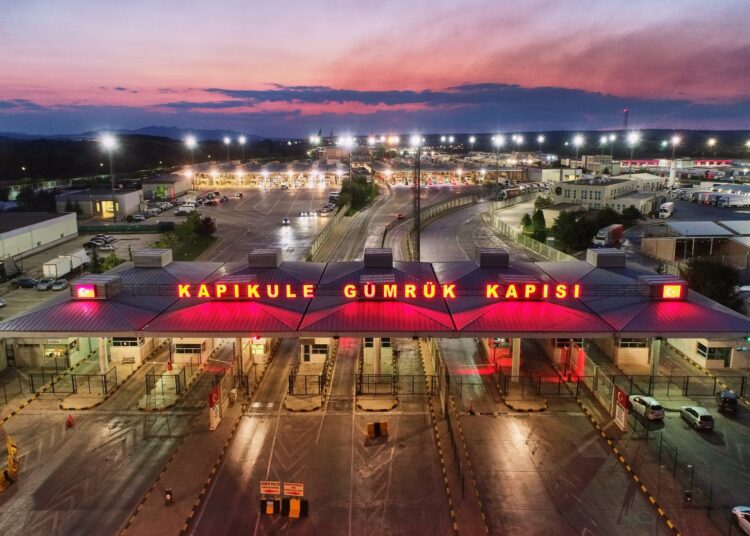Abdullah Bozkurt/Stockholm
The crackdown on bribery and corruption announced in April at Europe’s main land border crossing with Turkey appears to function primarily as a cosmetic gesture, designed to signal stronger border controls to EU counterparts while failing to tackle systemic problems.
In what authorities called a sweeping law enforcement action coordinated by the Edirne Chief Public Prosecutor’s Office, 38 customs officers stationed at the Kapıkule Border Gate were detained in April on charges of soliciting bribes from travelers and truck drivers passing through one of Europe’s busiest border crossings.
The raids, backed by the gendarmerie’s anti-smuggling and intelligence units, reportedly followed months of surveillance that included hidden cameras placed at customs checkpoints.
Prosecutors alleged that customs officials routinely extorted cash from drivers, especially long-haul truckers crossing the Turkish-Bulgarian border, in exchange for speeding up passport and cargo inspections, and in many cases, simply allowing the cargo to move forward without any inspections
Searches of the suspects’ homes uncovered significant amounts of undeclared cash — €21,325, $14,600 and nearly 90,000 Turkish lira — believed to be linked to illicit payments. Arrest warrants were also issued for more than 300 drivers accused of paying bribes, the vast majority of them Bulgarian truck drivers.

The investigation initially led to the arrest of 38 Turkish customs officials, 23 of whom were jailed pending trial on charges of bribery. Others were released under judicial supervision, including travel bans. But as the case unfolded, many of the detained officials were gradually freed, with defense attorneys arguing that the evidence — mostly camera footage and transaction records — did not prove that money had changed hands.
In court hearings defense lawyers highlighted gaps in the prosecution’s case. They argued that the mere speed of passport checks — sometimes completed in as little as 15 seconds — could not be construed as proof of bribery.
Others pointed out inconsistencies, noting that some suspects were jailed while colleagues facing similar allegations were released on bail. For example, a customs official who maintained a ledger documenting each bribe he accepted was mysteriously freed by Turkish authorities
Lawyers also criticized the reliance on circumstantial evidence, such as an officer “sitting at an angle” in surveillance footage.
By late summer all officers still in custody had been released following successful appeals. The Edirne Criminal Court ruled that the evidence was insufficient to justify continued detention, leaving no customs officials behind bars despite the sweeping nature of the investigation.
Meanwhile, the warrants for more than 300 truck drivers — almost all Bulgarian nationals — remain largely unenforceable. Defense lawyers following the case said it was unlikely that Turkish authorities would ever apprehend the foreign drivers implicated, raising questions about the feasibility and seriousness of the broader probe.
The Kapıkule Border Gate, linking Turkey’s Edirne province with Bulgaria, is the busiest land crossing between Turkey and the European Union. Each year, millions of passengers and more than a million trucks pass through its checkpoints, making it the primary artery for road freight between Anatolia and the continent.

As part of the Trans-European Transport Network (TEN-T), Kapıkule is the central corridor connecting Istanbul and Turkey’s industrial heartland with Central and Western Europe. The crossing handles a vast share of exports ranging from textiles and machinery to automotive parts, much of it destined for Germany, the Netherlands and other EU economies.
The border is also a focal point for illicit flows. Over the years Kapıkule has been repeatedly used to smuggle narcotics, counterfeit goods, arms and untaxed cigarettes into the European Union.
Investigations have shown that criminal networks exploit corruption among customs officials to move heroin and synthetic drugs along the Balkan route. The crossing has also been implicated in attempts to funnel illegal migrants and suspected terrorists into Europe, often concealed in cargo trucks. Such activities underline the vulnerability of the border, where bribes can buy passage for both contraband and people seeking to evade detection.
The border gate plays a sensitive role in migration management and security policy as well. It was a focal point during the 2015–2016 refugee crisis, when thousands of migrants attempted to cross into Europe. EU member states see Kapıkule as a frontline defense against irregular migration, smuggling and trafficking — a pressure point in ongoing EU–Turkey negotiations over border security and visa liberalization.

Against this backdrop the bribery scandal has deeper implications. For European partners, allegations that customs officers systematically extorted money from drivers reinforce longstanding doubts about Turkey’s ability or rather, its willingness to secure its borders with integrity. While Ankara touts the April raids as proof of accountability, the subsequent collapse of prosecutions and the release of suspects suggest otherwise.
The episode also fits into a broader pattern under the government of President Recep Tayyip Erdogan and his far-right ally, the Nationalist Movement Party (MHP). For years, both parties have faced credible accusations of being in bed with domestic and international crime syndicates, profiting from the huge cash flows generated by organized crime activities ranging from drug trafficking to illicit trade.
In this permissive political climate, Turkey’s judiciary, tightly controlled by the executive, has been systematically discouraged from pursuing or punishing the true masterminds of these criminal operations. Law enforcement agencies, meanwhile, have largely shied away from dismantling the powerful criminal networks that coordinate and oversee major smuggling, trafficking and money-laundering schemes, instead targeting low-level operatives or staging cosmetic crackdowns to placate public opinion and international partners.
For the EU the case illustrates the persistent vulnerability of its external borders to corruption. For Turkey it highlights the gap between high-profile anti-corruption campaigns and the entrenched networks that allow such practices to flourish. As one defense lawyer in the case argued, the accusations “could not stand on evidence,” a reminder of how fragile accountability remains in Turkey’s judicial system.












